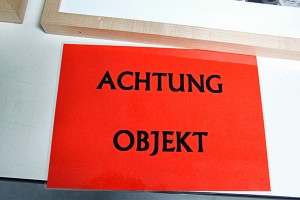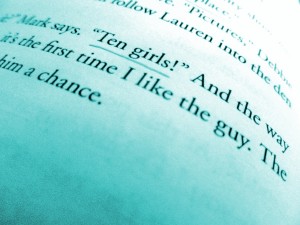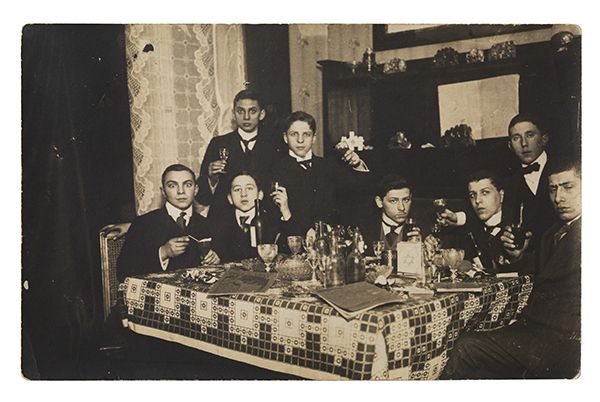
A label in our restoration studio to prevent anyone from inadvertently touching or removing an object.
© Jewish Museum Berlin, photo: Gelia Eisert
My story actually begins with a visit to the museum. It draws the curtain slightly on the making of an exhibit that’s usually veiled from the eyes of visitors. But first I have to tell another story, in order for both – one current and one from the past – to have meaning.
A little trail runs through our permanent exhibition pointing to David Friedländer (1750-1834). → continue reading
 In the past, a number of literary texts on Jewish topics contributed to Jewish culture in various ways. Some documented and revitalized oral history and folk tales in an attempt to save them from oblivion (e.g. Martin Buber’s Tale of the Hasidim); others made Jewish topics palatable to the majority society (e.g. Sidney Taylor’s All-of-a-Kind Family); and still others helped to build a Jewish community around shared experiences of ritual, emigration and persecution (e.g. Friedrich Torberg’s Tante Jolesch or The Decline of the West in Anecdotes).
In the past, a number of literary texts on Jewish topics contributed to Jewish culture in various ways. Some documented and revitalized oral history and folk tales in an attempt to save them from oblivion (e.g. Martin Buber’s Tale of the Hasidim); others made Jewish topics palatable to the majority society (e.g. Sidney Taylor’s All-of-a-Kind Family); and still others helped to build a Jewish community around shared experiences of ritual, emigration and persecution (e.g. Friedrich Torberg’s Tante Jolesch or The Decline of the West in Anecdotes).
Nathan Englander, one of the most sophisticated and provocative current writers, shares none of these intentions. His latest book, What We Talk About When We Talk About Anne Frank, is a collection of eight short stories loosely bound together under the title of (and a quote from) the first story, arising from a heated conversation about genocide; it refers to Anne Frank not as a historical figure, but as a metonym of victimhood. Accordingly, the stories reflect on the effect of Jewish themes, such as religion, the Holocaust and Israel, on modern Jewish identities. The author’s perspective is from within – he was born in 1970 to an Orthodox-Jewish family in New York – and critical. His gripping, intimate theatre-like episodes are fraught with tense dialog questioning the validity of Jewish cultural practice: → continue reading
Occasionally there’s an item in our collection that only reveals itself at second glance: for instance, this photograph of a group of men, taken in Lissa in the Prussian province of Posen, in 1913.

Walter Frost (1893 – 1968) with friends
Lissa, Posen, 1913, photography
© Jewish Museum Berlin, gift of Edith Marcus née Frost
You have to look very closely to recognize what’s lying on the table. In the left foreground, next to the various traces of an alcohol-infused social gathering, is an issue of the magazine Ost und West (East and West), and further to the right is a donation can for the Jewish National Fund with a Star of David on it. These objects allow us to connect the barely 9 x 14 cm little picture with the Zionist movement.
→ continue reading


